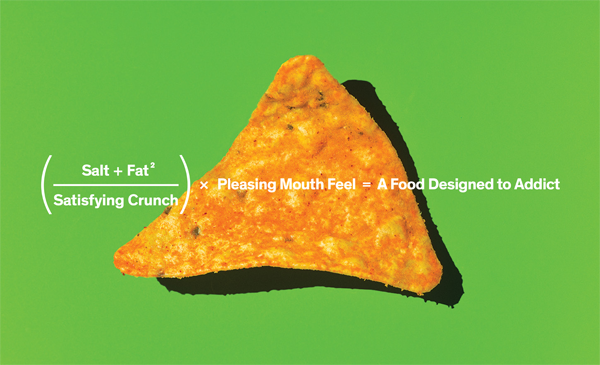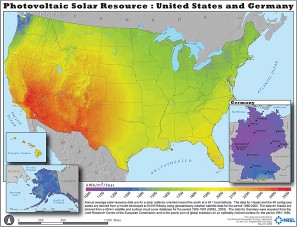The following short video recently went viral and received more than 5.5 million views on YouTube. Using accurate and easy to comprehend graphs, it showcases the full scope of U.S. income inequality. The video is mostly based on a paper written and published by Michael I. Norton and Dan Ariely, titled “Building a Better America—One Wealth Quintile at a Time.” It also references other data provided by a number of mainstream and progressive websites such as CNN, Motherjones and ThinkProgress. The video is receiving interesting responses from conservative and neo-liberals, who either challenge the accuracy of the video or attempt…
Blog Archives
Michael Moss on the extraordinary science of addictive junk food

In this editorial for the New York Times Magazine, Michael Moss discusses the “Extraordinary Science of Addictive Junk Food”. He begins the article, which derives from his current book “Salt Sugar Fat: How the Food Giants Hooked Us,” by describing a fateful afternoon when the CEOs from all the major corporations in the junk food industry gathered to be warned about their significant role in the American obesity epidemic. The article also features interviews with former and current junk food industry insiders, PR professionals and other experts who helped or continue to help create, market and sell the most addictive,…
Renewable energy could provide 99.9% of all power by 2030
It is commonly asserted that even with massive investments, solar, wind and other renewable energy technologies could not possibly meet all of the energy needs of any industrialized economy. However, a recent study done by Budischak et al. debunks this piece of conventional wisdom. The study suggests that with an optimized energy production and storage network, up to 99.9% of all energy needs could be met using nothing more than currently existing renewable energy technologies–and at roughly the same cost of conventional energy production. The abstract of the study report reads as follows: We model many combinations of renewable electricity sources (inland wind,…
Studying economics increases the tendency to lie
A working paper by Raúl López-Pérez and Eli Spiegelman, from universities in Montreal and Madrid, suggests that studying economics at the university might increase a student’s inclination to lie. The abstract for the paper reads as follows: “Recent experimental evidence suggests that some people dislike telling lies, and tell the truth even at a cost. We use experiments as well to study the socio-demographic covariates of such lie aversion, and find gender and religiosity to be without predictive value. However, subjects’ major is predictive: Business and Economics (B&E) subjects lie significantly more frequently than other majors. This is true even after…
Aaron’s Law: law and justice in a digital age (lecture by Lawrence Lessig)
In his inaugural speech as the Roy L. Furman Professor of Law and Leadership at Harvard Law School, Lawrence Lessig, a cyber-law expert and self-described mentee of Aaron Swarts, talks about Aaron’s life, his activism, and his ideas for a better world. He also discusses copyright and the access to information–not in the sense of access to the latest entertainment products, but rather access to academic material, government data, and other important information.
More reasons not to trust Fox News

There are of course many controversies surrounding Rupert Murdoch’s obnoxious Fox News, but it is no secret that Fox is very much a mouth-piece of American conservatism. According to a recent poll done by Public Policy Polling, Fox News currently enjoys the confidence of about 41% of American voters, which is basically the percentage of Americans who support the Republicans. In fact, Dean Debnam, President of Public Policy Polling, points out that: “We continue to find that Democrats trust most TV news sources other than Fox, while Republicans don’t trust anything except Fox. News preferences are very polarizing along party lines.”…
Freedom and free software (interview with Eben Moglen)
Eben Moglen, founder and chairman of the Software Freedom Law Center, is the ideal mix of a law professor mix and a free-software technologist. In the following two-part interview with Slashdot – News for nerds he talks about free software, locked down information systems, and the importance of sharing. Here is a passage from the interview, which is well worth watching: “One of the things which everybody really now understands is that what makes the web a miracle also contains its dangerousness. The web was created for openness and power of construction. The browser made the web extremely easy to…
The Gravity Light (creative responses)
From the category “creative responses to environmental challenges“: The Gravity Light. GravityLight is a revolutionary new approach to storing energy and creating illumination. It takes only 3 seconds to lift the weight which powers GravityLight, creating 30 minutes of light on its descent. For free. The makers of the Gravity Light started the project searching for options on how to bring affordable and sustainable energy and light source for places outside the power grid. They experimented with more conventional approaches utilizing solar technologies, but they ultimately came up with this quite ingenious invention:
The internet revolution (lecture by Alexander Bard)
Alexander Bard’s provocative keynote speech at Next Berlin 2012 challenges the way history is taught, with industrialization presented as the climax of human history. He believes we need to contextualize history not in terms of the Stone Age, Bronze Age, Iron Age, and Industrial Age, but rather in terms of information, such as spoken information, written information, printed information, broadcasted information and finally the Internet as participatory information. Trained in sociology, Bard examines technology in the context of the paradigm changes that are taking place in society. His observations on identity shifts in today’s youths is especially compelling. Young people are…
How the Dutch got their cycling paths
The story of the amazing bicycle paths in the Netherlands serves as an excellent role-model for anyone challenging the dominant form of urban transportation as it does away with common objections against promoting cycling, namely, that it is impractical or unpopular. The short video below outlines exactly how the Dutch got their cycling paths. There is no reason to believe this couldn’t be accomplished elsewhere. The official description of the video reads as follows: Road building traditions go back a long way and they are influenced by many factors. But the way Dutch streets and roads are built today is largely the…
The week the world stood still (by Noam Chomsky)
In his article “The week the world stood still,” published originally on TomDispatch, Noam Chomsky reminds us how close the world came to thermonuclear apocalypse in 1962 and also provides some insight into what really happened behind closed doors during the standoff between the US and the Soviet Union. It is of great importance to get the facts right about this dark moment in human history right, especially since the majority of people on earth were not alive in 1962 and can only learn about it through historical scholarship. Noam Chomsky therefore does us a great service in this article; his…
How viable is Economics? (lecture by Steve Keen)
In the lecture below, Steve Keen, Associate Professor of Economics & Finance at the University of Western Sydney and author of Debunking Economics, questions the viability of modern neoclassical macroeconomics and its premises. His critique not only calls into question what is taught in virtually every economics department around the world, but also casts doubt on the typical policy recommendations made by neoclassical economists.
Affluent people and trickle-down economics
When the latest republican president, George W.Bush encouraged people to go shopping and introduced massive tax cuts on corporations and the wealthiest he acted as perfect role model for conservative economic politics. Mitt Romney is now running for president by promoting the same ideas and further tax cuts. These conservative policies are often justified by recourse to “trickle-down economics,” the idea that tax breaks or other economic benefits provided by the government to businesses and the wealthy will result in further investment by the rich, leading to more jobs and hence benefiting the poorer members of society. But does money really trickle down? The…
Garbage Warrior (documentary)
Michael Reynolds is a true maverick; he sees humanity marching toward the edge of a cliff and he’s not willing to go along with the crowd. Instead he uses his skills as a trained architect to show people that there is another, better way of living, one which is sustainable, ecologically beneficial, and 100 percent self-supporting. He builds homes–even entire communities–that are completely off the energy grid, collect water from rainfall, recycle waste, and are made from mostly garbage and recycled materials. It’s called “Earthship Biotecture” and it may very well be the most profound and practical solution to the pressing environmental challenges…
The off-the-grid, do-it-yourself smart-home (creative responses)
From the category “Creative responses to environmental challenges“: The off-the-grid, do-it-yourself smart-home. Challenging numerous conventions about housing, C++ pioneer Loren Amelang designed his off-grid house just the way he wanted. It is filled with innovative solutions to the energy problems associated with traditional houses and nicely balances comfort with sustainability and efficiency. His smart home also challenges the illusion that modern technology and sustainability are mutually exclusive.
Upward mobility in the U.S. is a myth
Robert S. Strauss used to say that every politician wants you to believe he was born in a log cabin he built himself. Republicans in particular never tire of emphasizing the unparalleled opportunities that exist in US, where hard work and determination can propel anyone out of humble beginnings into the White House, or at least a mansion on a hill. But is this really the case? A recent international study examined the relationship between wealth, heritage and inequality across generations. Here’s the abstract: We study the role of parental wealth for children’s educational and occupational outcomes across three types of…
How wired is your life? (by Santiago Zabala)
AlJazeera recently featured an excellent article by Santiago Zabala, ICREA Research Professor of Philosophy at the University of Barcelona in its opinion section. In his article Zabala emphasizes that in our digital world, in which the internet and social networks have become as common as “the air we breathe,” critical thinking is more important than ever. Some quotes from the full article: It is interesting to notice how often this question is answered simply by noting the amount of time we spend online (following the US presidential campaign or admiring MOMA‘s online collection) rather than by qualifying our ability to interpret the…
Sex, Lies and Julian Assange (documentary)
Julian Assange and Wikileaks continue to be popular topics for the media, although most of the media coverage is either biased or superficial. Sex, Lies and Julian Assange, reported by Andrew Fowler and presented by Kerry O’Brien, is an exception to this trend. In the brief space of 43 minutes, the investigative documentary revisits the advent of Wikileaks and the controversy surrounding its editor-in-chief, Julian Assange. Through well-selected interviews and detailed research, especially on the sexual offence allegations in Sweden, the documentary presents the story of Wikileaks and Julian Assange in a remarkably clear, unbiased way. It states what the mainstream…

